Abdifatah Mohamed Sirat, a passionate advocate from Garissa and Wajir counties, recently shared insights into his journey as a human rights defender and his dedication to social justice, citizenship rights, and digital inclusion in Kenya.
During the conversation, he explained his primary motivation: addressing the deep-rooted challenges faced by marginalized and pastoralist communities in Northern Kenya, especially in accessing basic services and legal identification.
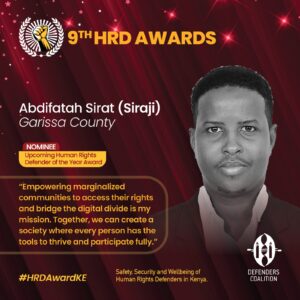
The digital activist described how his work focuses on advancing citizenship rights, emphasizing that many individuals in pastoralist communities lack essential identification documents, which are critical for accessing healthcare, education, and other social services. He noted that this issue often leaves people feeling excluded from their own country and unable to claim their rights. To tackle this, Abdifatah founded the Generation Nomad Organization, a platform that provides these communities with crucial support and guidance in navigating the legal processes required to obtain identification.
Through Generation Nomad, Abdifatah collaborates with organizations like Namati, Haki na Sheria, and the Commission on Administrative Justice to advocate for policy reforms and raise awareness about citizenship rights. He explained that these partnerships enable him to address issues at both the grassroots and policy levels. “Working with these organizations allows us to achieve systemic change,” he said, highlighting that collaborating with well-established bodies strengthens his advocacy work.
In addition to citizenship rights, Abdifatah is an active member of Amnesty International, focusing on digital inclusion. He shared that, in his view, digital access is essential for all communities in Kenya, including those in rural and underserved regions. Abdifatah emphasized that bridging the digital divide is a critical aspect of his work, as he believes technology can empower individuals to access information, connect with resources, and advocate for their rights.
Abdifatah also discussed his approach to community empowerment. He shared how he organizes workshops, community sensitization forums, and advocacy campaigns aimed at educating communities on their rights and encouraging individuals to claim their identities. These efforts, he said, go beyond simple awareness-raising; they empower individuals to take concrete steps to secure essential services. “Empowerment begins when people know their rights,” he said, adding that his role is to facilitate that knowledge and make people aware of the support available to them.
Gender equality and peacebuilding are also critical parts of Abdifatah’s work. He explained that by addressing gender-based violence, promoting peace, and facilitating dialogues between conflicting groups, he hopes to foster greater social cohesion in the region. Abdifatah expressed pride in his gender equality initiatives, noting that they help empower women and youth while promoting stability within communities. He said he believes that peacebuilding is essential to creating lasting change, especially in areas affected by conflict and historical marginalization.
Reflecting on the impact of his work, Abdifatah noted that hundreds of individuals have successfully obtained identification documents through his advocacy, granting them access to essential services. He added that his digital rights campaigns have significantly improved information access for rural communities. “Knowing that our efforts are making a real difference in people’s lives is incredibly fulfilling,” he shared, emphasizing the personal motivation that drives him.
However, Abdifatah’s path hasn’t been without challenges. He admitted to facing personal risks, threats, and resistance from conservative elements within his community. Despite this, he remains steadfast. He explained that building trust within the community and working alongside local leaders has allowed him to navigate these complex socio-political environments. “It’s about resilience and never losing sight of why you started,” he reflected.
Ross Alwala is a trailblazing mental health advocate and social entrepreneur from Kisumu, Kenya. Ross’s work has transformed mental health accessibility for underserved communities, particularly young people. Ross is the founder of “Train Your Brain,” an initiative that leverages technology to make mental health services more affordable and accessible.
Ross has made significant strides in Kenyan mental health policy. In July 2023, Ross presented a groundbreaking petition to decriminalize suicide, initiating crucial discussions in the Kenyan Parliament about this often-overlooked issue. This step toward policy reform reflects Ross’s commitment to breaking the stigma surrounding mental illness and challenging outdated legal frameworks.
Ross’s personal journey and vision for a fairer society is what fuels Ross’s work in activism. Growing up in a single-parent family in Nyalenda, Ross encountered financial and health-related challenges that fueled resilience and dedication. The desire to help people who are struggling with mental health is what drives Ross’s work. This deep connection to mental health issues is what motivated the creation of resources and support for young people lacking access to care.
Through “Train Your Brain,” Ross has reached over 1,500 individuals on social media, facilitated affordable therapy for 100 young people, and created job opportunities for psychologists in Kenya. Ross is also a mentor, educating young people on building mental resilience and encouraging open discussions about mental health.
Despite the challenges, Ross’s advocacy continues to grow through the innovative use of technology, strategic partnerships, and ability to mobilize resources. All these have enabled Ross to make tangible impact on Kenya’s mental health landscape. Ross’ work exemplifies the essence of human rights advocacy, promoting equity, inclusion, and resilience. The award would amplify Ross’s efforts, attract valuable partnerships, and enhance the capacity to drive long-term changes in mental health care accessibility
Roselyn Njoki Nyagah has been nominated for the Upcoming Human Rights Defender of the Year Award, recognizing her significant contributions to advocating for the rights of minorities, particularly persons living with disabilities in the grassroots areas of Trans Nzoia County. Roselyn has overcome her physical limitations, proving that disability is not inability, and has become a household name in Trans Nzoia County, well-known for her advocacy for the rights of girls and women living with disabilities.
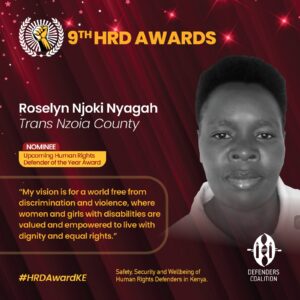
Her commitment to fighting for human rights over the past nine years has seen her rise to become the secretary of the Trans-Nzoia Youths Living with Disability (CBO) and CHEKISAE, a women’s group that champions the rights of persons with disabilities. Her notable contributions include combating gender-based violence, rescuing children with disabilities facing oppression, advocating for access to healthcare for women and girls with disabilities, and promoting education for children with disabilities by advocating for the allocation of bursaries. Roselyn has been at the forefront of petitioning relevant authorities to ensure that the rights and voices of persons with disabilities are adequately addressed.
On 15th April 2024, Defenders Coalition in conjunction with the Working Group on Human Rights Defenders in Kenya sent out a call for nominations for HRD Awards 2024 that was open until 31st July 2024.
The summary of the nominations was as below:
Total Nominations were 211 under the following criteria
The Jury of the HRD Awards, using the set criteria and after a thorough background check and verification on the nominees work and profiles, has selected the following individuals for public recognition during a public ceremony on 29th November 2024.
Upcoming Human Rights Defender of the Year Award
Human Rights Defender of the Year Award
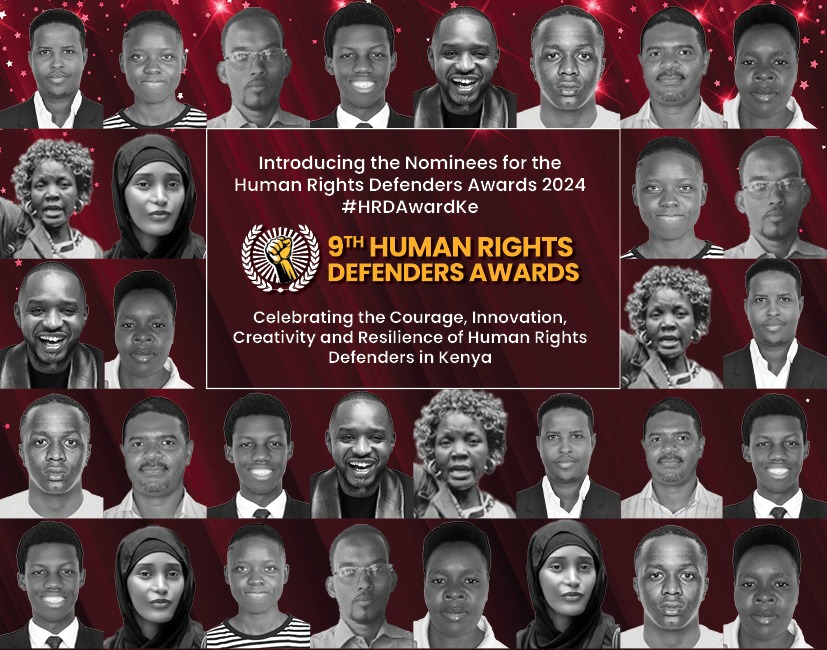
In 2019, Kimutai Koske Gideon, a devoted human rights defender from Bomet County, participated in the Defenders Coalition’s Human Rights Defenders (HRD) Academy. Specializing in advocating for the rights of children, women, persons with disabilities (PWDs), and marginalized groups, Kimutai’s journey has been driven by a deep passion for justice. The HRD Academy became pivotal in his advocacy work, offering him the tools and connections he needed to take his efforts to the next level.
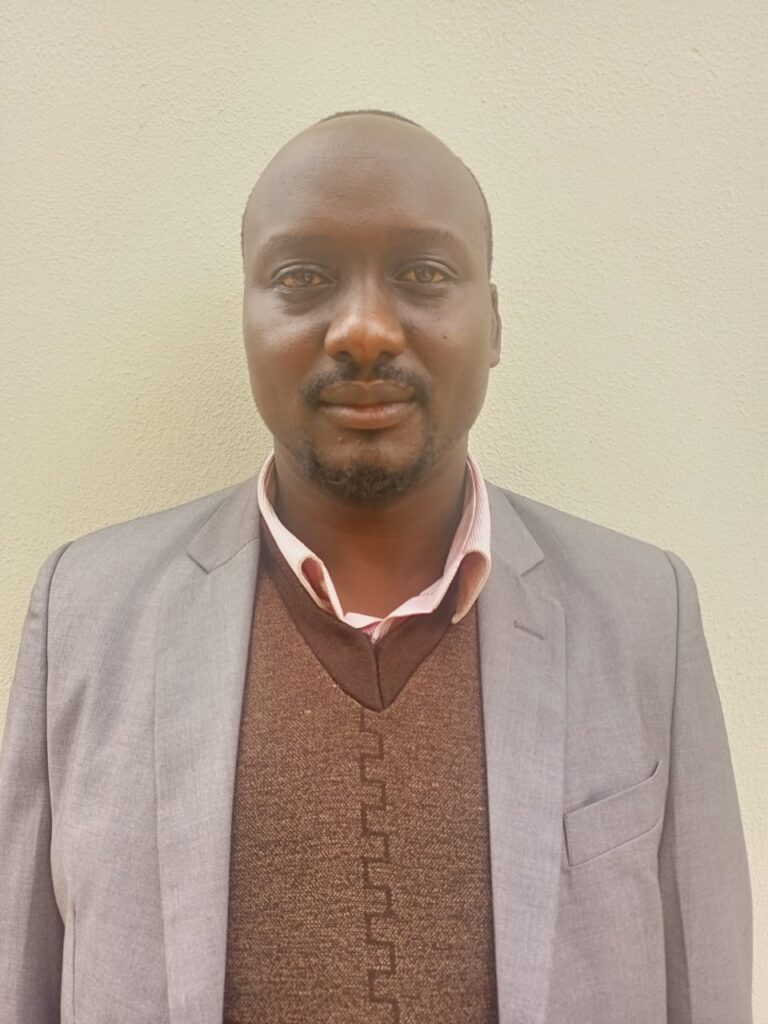
One of the most impactful takeaways from the Academy for Kimutai was learning about security and digital safety. “In our line of work, we often face serious threats,” he shares, “but the security skills I gained from the Academy have helped me protect myself and others while continuing the fight for human rights.” These lessons are now woven into the fabric of his daily work, helping him stay safe and navigate the often dangerous terrain of human rights advocacy with greater confidence.
What also struck Kimutai was the sense of community he discovered during the Academy. Meeting and connecting with other defenders from different parts of Kenya gave him a renewed sense of purpose. “The networking was invaluable,” Kimutai reflects, “I was able to build lasting relationships with other defenders who are just as passionate about justice.” These relationships led to the creation of Combined Efforts Now, a network of defenders in Narok County, and the Human Rights Network for the South Rift Region, which spans Bomet, Kericho, and Narok counties. Through these networks, Kimutai and his peers have been able to elevate the voices of marginalized communities, advocating for their rights and shining a light on the injustices they face.
Since his time at the Academy, Kimutai has been applying the skills he learned to support fellow defenders in his community. “Before, documenting human rights violations felt overwhelming,” he says, “but now, I can monitor and document abuses with ease, making sure that every case is recorded and reported.” This has not only empowered him but has also equipped others around him to take action and push for justice more effectively.
For Kimutai, the most inspiring aspect of the Academy was the shared experience of being surrounded by other defenders. “We all came from different backgrounds, but we had one goal—to stand up for those who can’t stand up for themselves,” he recalls. This sense of unity has continued to fuel his drive to create meaningful change in his community.
Looking forward, Kimutai remains deeply committed to the cause. With the knowledge, skills, and connections gained from the HRD Academy, he is now better equipped to advocate for the rights of the most vulnerable. “The Defenders Coalition has been a beacon of support for us,” he says. “Because of them, we can do more, reach further, and continue this vital work.”
Through his resilience and unwavering dedication, Kimutai Koske Gideon continues to make a profound impact in Bomet and the wider South Rift region, fighting for a more just, equal, and safe future for all.
In 2022, Azani Ngumbao Thoya, a passionate human rights defender from Kilifi County, took a bold step to strengthen his impact by joining the Defenders Coalition’s Human Rights Defenders (HRD) Academy. With a heart dedicated to protecting girl child rights, combating sexual and gender-based violence (SGBV), and promoting sexual reproductive health education, Azani sought to make a deeper difference in his community—and he has.

Azani’s journey as a defender has always been fueled by a desire to uplift those most vulnerable, but the HRD Academy equipped him with the tools to do so more effectively. The training on physical and digital security for human rights defenders gave him the confidence to navigate the challenging environment in which he works, while the lessons on resource mobilization helped him turn his ideas into action.
One of the most impactful initiatives Azani has launched since the academy is the “Young Women Symposium.” Held in both 2023 and 2024, the symposium brings together young women from Kilifi County to educate them about their rights and create a safe, empowering space for them to share their experiences. “Seeing these young women realize their strength and rights has been incredible,” Azani shares. “They’re not just learning—they’re going back into their communities and advocating for themselves and others.”
But Azani’s vision didn’t stop there. Understanding the importance of economic empowerment, he successfully mobilized resources to launch the “Kilifi Youth in Technology” program, where young people in Kilifi learn valuable digital skills that connect them to international markets. Through this initiative, local youth are gaining employable skills, securing opportunities, and building brighter futures for themselves. “It’s been amazing to see young people here not only learning new skills but also realizing that they can compete on a global level,” Azani says.
The networks Azani built during the HRD Academy have been another key to his success. With these connections, he’s been able to collaborate on various advocacy campaigns, including the planning of World Mangrove Day in Kilifi, focusing on the intersection of environmental protection and human rights.
Despite the progress, Azani faces challenges—among them, securing funding for grassroots human rights work. “The need is there, the passion is there, but without financial support, it’s hard to scale up and reach as many people as we need to,” he explains. He hopes that with increased resources, defenders like himself can expand their efforts and continue making a meaningful impact.
Azani Ngumbao Thoya’s dedication, combined with the skills he gained from the HRD Academy, is creating real change in Kilifi. His work is empowering young women, equipping youth with the skills they need to succeed, and advocating for a safer, more just society. Through his relentless efforts, Azani is building a community where rights are known, voices are heard, and opportunities are within reach for all.
Patrick Naweet Sentenced To 30 Years In Prison For The Murder Of Women Human Rights Defender – On Elizabeth Ekaru
24 October 2024, Nairobi, Kenya.
In a landmark ruling delivered by the Meru High Court, Patrick Naweet was sentenced to 30 years in prison for the murder of Elizabeth Ibrahim Ekaru, a well-known Woman Human Rights Defender (WHRD).
The court’s decision comes in a record three years after Naweet stabbed Ekaru to death following a dispute over land on January 3, 2022, in Isiolo County.
The Defenders Coalition welcomes this verdict as it is a pivotal moment for the human rights community, particularly for those advocating for gender justice in Kenya.
Kamau Ngugi, Executive Director of the Defenders Coalition, appreciated the swiftness of the court and significance of the sentencing
“This verdict is a major victory, not only for Elizabeth Ekaru’s family but also for the entire human rights community in Kenya. It reinforces the importance of safeguarding women’s rights, which continue to be violated despite constitutional protection.”
Ngugi emphasized that the ruling also reaffirms the Kenyan justice system’s role in upholding the rule of law, particularly in cases involving gender-based violence (GBV). Ekaru’s case, he said, shines a spotlight on the escalating violence against Women Human Rights Defenders (WHRDs), who are often targeted with violence both in private and public spheres.
“This conviction sends a strong message that the justice system can and will protect women and human rights defenders,” he added.
The case highlighted not only the brutality of femicide but also the cultural biases that complicate the fight for gender justice.
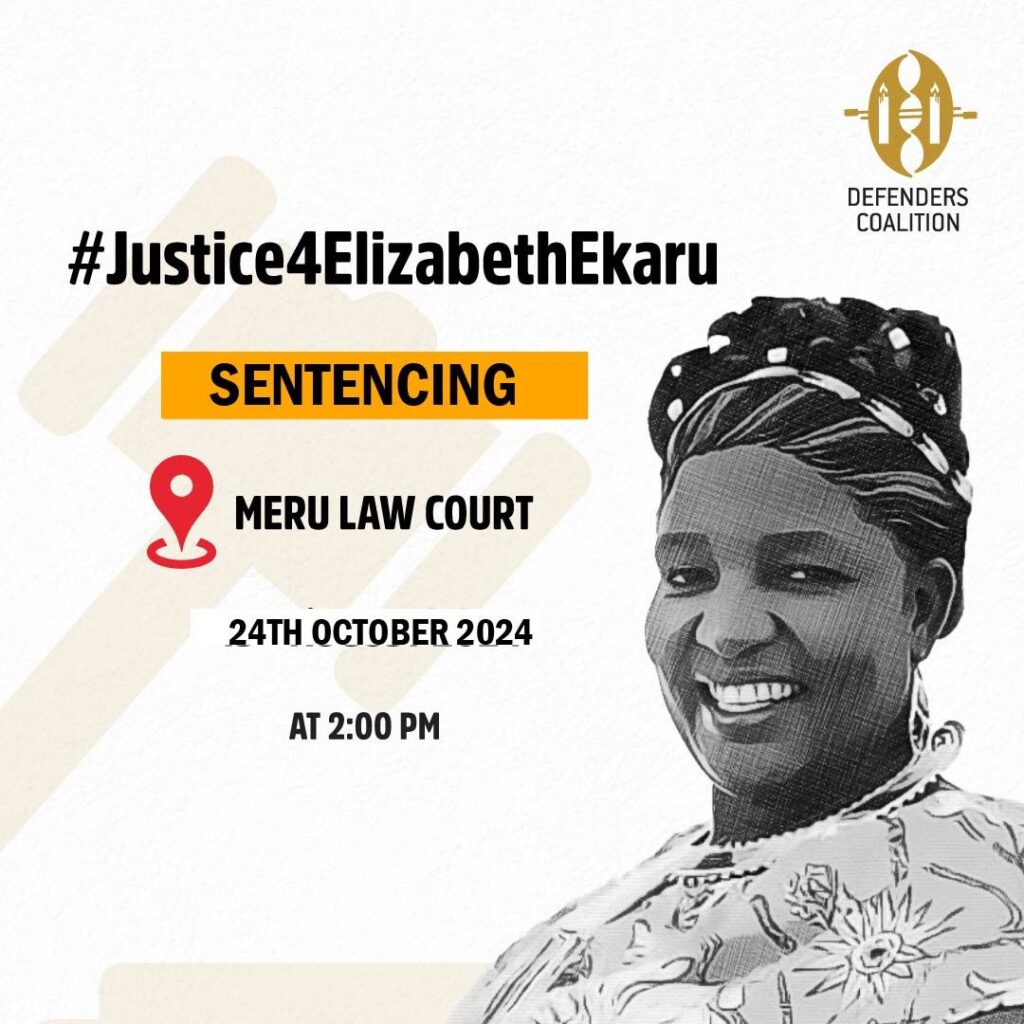 During the trial, Naweet claimed he had never encountered a woman who was outspoken and an activist, citing his traditional Turkana background. His defense exposed the patriarchal structures and cultural prejudices that often stand in the way of justice for women in Kenya.
During the trial, Naweet claimed he had never encountered a woman who was outspoken and an activist, citing his traditional Turkana background. His defense exposed the patriarchal structures and cultural prejudices that often stand in the way of justice for women in Kenya.
Following the sentencing, Grace Lolim of Isiolo Gender Watch lauded the court’s decision as a societal milestone in the battle for gender justice.
“This is not just a legal victory; it sets a new precedent for how cases involving violence against women should be handled in Kenya. We hope this will push for much-needed reforms that make justice for survivors of violence quicker and more accessible,” Lolim said.
Ekaru’s case has underscored the urgent need for stronger protection mechanisms for WHRDs in Kenya, as well as more gender-responsive laws to ensure that victims of violence, like Elizabeth Ekaru, are not silenced but rather supported and protected.
By holding Naweet accountable for his actions, the justice system has empowered other women advocates to continue their work without fear. It shows that Kenya is recognizing the work of Human Rights Defenders in the country. This legal victory is very timely and relevant in our society given the rising cases of violence against not only Women Human Rights Defenders but also the Human Rights Defenders Community at large.
The Defenders Coalition welcomes this groundbreaking sentence and appreciates the courts for honoring the duty placed upon it by the Constitution, to deliver justice while upholding national values of human rights and non-discrimination based on gender.
Elizabeth Ekaru’s courage and resilience will continue to inspire the women of Kenya and Human Rights Defenders across the world. As we honor her memory, we reaffirm our commitment to fight for a society where women’s voices are heard and recognized and that their rights are protected.
Read media Coverage here
https://www.facebook.com/share/v/1WCGCQzSiris4EAd/
https://thepresspoint.com/breaking-news/isiolo-human-rights-activist-killer-jailed-for-30-years/
https://ruraltimesnews.com/security-guard-lands-30-years-in-prison-for-killing-isiolo-activist
This joint submission was presented to the Human Rights Council at the Universal Periodic Review (UPR) of Kenya, focusing on the state of civil and political rights, particularly the freedom of assembly, association, and the protection of human rights defenders (HRDs). Submitted by the National Coalition of Human Rights Defenders (Defenders Coalition) in collaboration with key organizations including the Social Justice Centres Working Group, Coalition for Grassroot Human Rights Defenders, Protection International – Africa, Kenya Human Rights Commission, Pema Kenya, The Gay and Lesbian Coalition of Kenya (GALCK+), Universal Rights Group, Ogiek People’s Development Programme, and 0 this report sheds light on the growing challenges facing civic space in Kenya.
The submission outlines the systemic obstacles to the enjoyment of fundamental rights in Kenya, documenting instances of police brutality, repression of peaceful protests, and attacks on HRDs. It calls for urgent reforms to uphold Kenya’s obligations under international human rights standards and protect those working to safeguard the rights of all citizens.
Defenders Coalition – UPR Kenya Joint Submissions (2024) .docx
This submission is presented by DefendDefenders (East and Horn of Africa Human Rights Defenders Project), an NGO with Special Consultative Status with ECOSOC, in collaboration with the National Coalition of Human Rights Defenders-Kenya (Defenders Coalition). Submitted on 11 October 2024, this report aims to provide an overview of the state of human rights in Kenya, with a particular focus on the challenges faced by human rights defenders (HRDs) and key areas requiring reform and government action.
Our submission draws attention to the shrinking civic space, violations of fundamental freedoms, and the need for enhanced protection mechanisms for HRDs in Kenya. The review is a critical opportunity to hold Kenya accountable to its international human rights obligations and to strengthen the frameworks that ensure the safety, dignity, and rights of all its citizens.